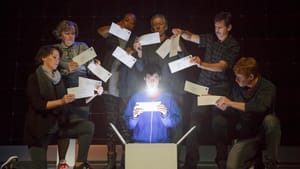Stay in the Loop
BSR publishes on a weekly schedule, with an email newsletter every Wednesday and Thursday morning. There’s no paywall, and subscribing is always free.
The curious adaptation of the novel
Broadway Philadelphia presents 'The Curious Incident of the Dog in the Night-Time

Playwright Simon Stephens crafted an ingenious way to adapt Mark Haddon’s 2003 novel for the stage: Let the story’s characters create a play based on the main character’s writing. The result? We watch the book being adapted.
It makes an enjoyable novel about a challenging subject – an autistic teenager’s desire to find a neighbor’s dog’s killer – into a satisfying stage play that won five Tony Awards, six Drama Desk Awards, and more. The thousands of Philadelphia students reading the novel (this year’s annual city-wide “Everyone Is Reading” selection) who also see the play will enjoy a fine example of modern innovative stagecraft, complete with large video projections, seat-rattling sound, and abstract staging.
Special special effects
Tony Award-winning director Marianne Elliott uses her Broadway budget for this touring production lavishly, despite the need to fit many different theater spaces around the country. Bunny Christie’s set holds three tall black walls for Finn Ross’s video design, framed in bars of light by Paule Constable. Some of the projections look perfunctory, like the outlines of neighborhood houses. When main character Christopher (Adam Langdon) imagines being an astronaut, however, this huge electronic canvas comes alive. He runs away to London, experiencing the chaotic outside world alone for the first time, and the projections vividly illustrate his panic and dismay. What Christopher writes and draws on the floor also simultaneously appears on the walls.
The best effects, however, are low tech. Elliot and choreographers Scott Graham and Steven Hoggett use an ensemble of 12 to play not only an array of fun supporting characters, but also furniture and props. They often physically lift Christopher, passing him about to mimic his twisting emotions. In one travel sequence, Christopher is held by two actors so he’s perpendicular to the wall; as a street scene is projected as if looking down from above, he appears to walk on the wall. The cast’s actions also viscerally amplify his emotions, especially during panic attacks and rages. While all the Broadway high-tech light and sound is great fun, Elliott’s vision would be just as exciting and effective on a bare stage.
A special story
Christopher’s story is an often harrowing adventure, as we see and hear everything from his point of view, though often through narration by his teacher Siobhan (Maria Elena Ramirez) and other actors playing his classmates. Finding the neighbor’s dead dog leads him to information about his dead mother and bitter father, stunning revelations he finds difficult to process. Langdon’s extraordinary performance as Christopher resists making him too cute; he’s every bit as exasperating, demanding, endearing, and intelligent as any real autistic child. Moreover, Christopher is a teenager, which means trouble no matter what.
Occasionally, the play’s extra layer – that we’re watching is a rehearsal of a play in process, created by a class – emerges, but not enough to slow the action. The best moment this adds actually occurs after the curtain call, so don’t run for the door after applauding.
Gene Gillette is properly frazzled as Christopher’s father, and Felicity Jones Latta reveals Christopher’s mother emotional growth. Ramirez’s patient Siobhan anchors the play as Christopher’s mentor and conscience.
The Curious Incident of the Dog in the Night-Time won’t feel repetitive for students who’ve read the novel. They’ll be treated to a fast-moving, intense, yet warm and funny version of the tale that provides insight about the novel – and also, almost subversively, teaches that theater can be surprising and fun too.
What, When, Where
The Curious Incident of the Dog in the Night-Time. By Simon Stephens; adapted from the novel by Mark Haddon; Marianne Elliot directed. Through March 5, 2017 at the Kimmel Center’s Academy of Music, 240 S. Broad Streeet, Philadelphia. (215) 893-3333 or kimmelcenter.org.
Sign up for our newsletter
All of the week's new articles, all in one place. Sign up for the free weekly BSR newsletters, and don't miss a conversation.

 Mark Cofta
Mark Cofta